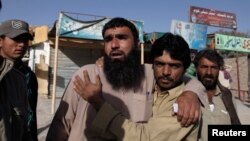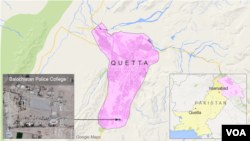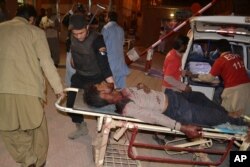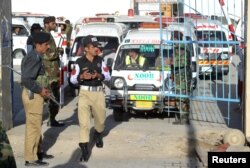lslamic State has claimed responsibility for a suicide attack that targeted a police training center in southwestern Pakistan, killing at least 61 recruits and wounding more than 120 others.
The assault began just before midnight in Quetta on Monday, with three assailants entering the hostel for recruits inside the complex and spraying occupants with bullets.
On Tuesday, Islamic State, via its Amaq news agency, released pictures of the three attackers, with machine guns and explosives strapped to their bodies.
Witnesses say the attackers quickly seized a number of hostages before Pakistani troops and commando units surrounded and entered the facility to confront the gunmen.
Battle to clear complex
The battle to clear the complex lasted several hours. Two attackers blew themselves up while a third was gunned down in the exchange of fire with security forces, ending the siege just before dawn on Tuesday, said a provincial official.
“They (the victims) were all unarmed trainees who are normally at that time of the night either retiring to their bed or engage with their smart phones or other phones in their private leisure time. So, they took them by surprise,” provincial government spokesman Anwar-ul Haq Kakar told VOA.
Some of the police and others inside the building escaped by jumping out windows. They told reporters the gunmen were wearing masks and started shooting as soon as they got inside.
Kakar said authorities have yet to determine the number of attackers, adding that he saw the body of one of them. A preliminary probe concluded the assailants were Uzbek militants.
Allegations of Afghan, Indian involvement
The spokesman alleged that Afghan and intelligence operatives from rival India jointly facilitated the deadly assault like some previous terrorist acts hitting his province.
“We are quite clear about this that they were being handled by Afghanistan and they were Afghan nationals as far as initial assessment is concerned,”Kakar asserted.
Dawa Khan Minapal, a deputy spokesman for Afghan president Ashraf Ghani, said, “The Afghan government condemns the attack on the police training center in Quetta and rejects any suggestion that Afghanistan was involved in the attack.”
US condemns attack
The United States has also condemned the terrorist attack in the capital of Baluchistan province.
“We stand with the people of Pakistan and Government of Pakistan at this difficult hour, and we will continue to work with our partners in Pakistan and across the region to combat the threat of terrorism,” said State Department spokesman John Kirby in Washington.
For its part, the Afghan government accuses the Pakistani spy agency of covertly supporting the Taliban and its ally, the Haqqani Network that have staged similar attacks on its side of the border.
Border challenges
U.S. Commander of NATO forces in Afghanistan General John Nicholson this week again acknowledged the nearly 2,600-kilometer long frontier posed challenges to both the countries.
“It’s still a very porous border region and we do see insurgents moving both ways across the border, some from Afghanistan to Pakistan and then of course the Haqqanis and the Taliban moving from Pakistan into Afghanistan,” the general told NBC.
He said there is a need for Afghans to increase the number of border posts on their side and both the neighboring countries also need to increase their coordination procedures.
The Pakistani province, particularly Quetta, has lately seen a spike in militant attacks. A suicide blast in early August just outside a hospital in the city killed more than 70 people.












